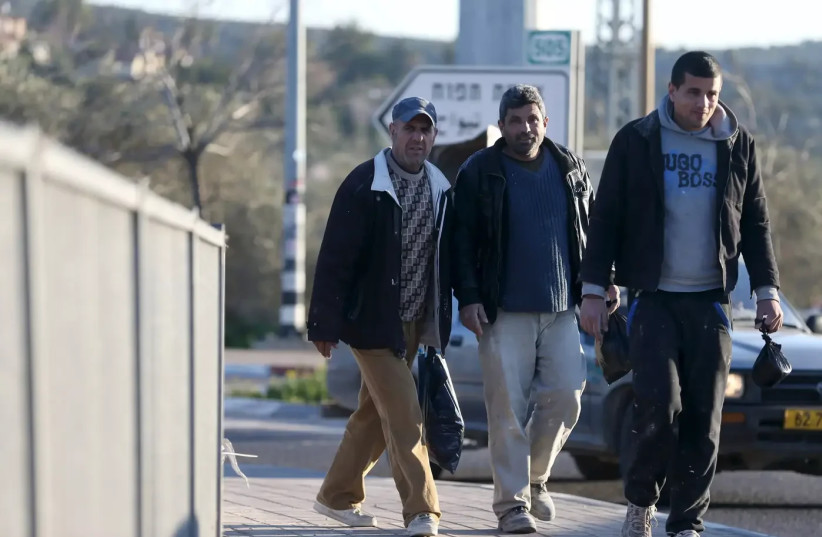The Likud's ministers in the government should not support any decision to allow Palestinian workers from the West Bank into Israel, 12 Likud Members of Knesset (MKs) and two ministers wrote in a petition addressed to the other ministers of the Likud on Wednesday.
The petition followed an admission by Prime Minister Benjamin Netanyahu on Saturday that Israel was considering a pilot program for the entry of Palestinian workers aged 45 and older, and after Defense Minister Yoav Gallant warned this week that not allowing Palestinians to work in Israel would strengthen Hamas in the West Bank and ultimately lead to a deterioration in the security situation.
Walla reported earlier this week that the Population and Immigration Authority was examining a proposal from the head of the Contractors Association, Eran Siv, for a personal file for each worker intending to come to Israel. The intention is to facilitate the entry of older Palestinian workers with a clean security record in Israel who have been working in Israel for years.
"Since the beginning of the war on October 7, central sectors of the economy have frozen due to their dependence on workers from Judea and Samaria and Gaza," the petition began. "The required quota (of workers) for the economy can be filled by agreements with a number of countries, in which there are thousands of workers interested in working in Israel."
Gov't is 'tarrying' from doing so

However, the government is "tarrying" from doing so, and every day that the sectors return frozen cost the state NIS 3.1 billion, the petitioners claimed, based on what they said was data from the finance ministry.
"In parallel, there is talk in the government of returning tens of thousands of Palestinian workers into Israel, as if October 7 never happened," and despite what they claimed were 83% of Palestinians in the West Bank who supported Hamas' October 7 massacre.
"It is not clear how the government of Israel wishes to run a 'pilot' on the security of its citizens? Should we enter Palestinian workers and see if they are murderers? Have we learned nothing?" the MKs and ministers wrote.
The question of the reentry of Palestinian workers has divided politicians in both the coalition and opposition - and even within political parties themselves - for weeks, as the MKs from the Likud who signed the petition – as well as MKs from the far-right Religious Zionism and Otzma Yehudit parties – have argued that despite preemptive screening by the Shin Bet, these workers could pose a security risk and provide information for future attacks against Israel.
In the opposition, MKs from the right-wing Yisrael Beytenu party and even some MKs from the centrist Yesh Atid party have argued against bringing Palestinian workers back, while others from Yesh Atid, Labor, and the two Israeli-Arab parties – Ra'am and Hadash-Ta'al – support the move.
Despite the fact that the petition was addressed to the Likud's ministers, two of the signers were Likud ministers themselves: Economy Minister Nir Barkat, and Diaspora and Combating Antisemitism Minister Amichai Chikli. There are 16 other Likud ministers, including Netanyahu and Barkat.
Barkat is a leading candidate to run for the head of Likud should Netanyahu step down or be removed from office, and has consistently criticized the prime minister and defense ministers' handling of the war.
"Gallant lives in the mistaken conception of October 6. It is sad to see that Gallant still believes that distributing money to the Palestinians will buy us quiet from terrorism," Barkat said in a statement earlier this week. "It is not Israel's job to find employment for Palestinian workers … what was will not repeat itself," he added.
The economy minister repeated his claim following the ramming and stabbing attack in Ra'anana on Monday.
One of the MKs who signed the petition, Dan Illouz, added on Wednesday that "the October 7th massacre, facilitated by Palestinian workers from Gaza using their work permits, is a harsh lesson against underestimating extremist threats. This tragedy has shattered the illusion that boosting the Palestinian economy will lead to peace. The reality is that these terrorists are driven by a Nazi-like ideology of hate, not economic hardship."
"Israel must now act decisively.," Illouz said. "We should stop the entry of Palestinian workers from Judea and Samaria, as their support for such atrocities signifies a clear danger. Our nation is not responsible for Palestinian livelihoods; they should develop their own economy. For our labor needs, global alternatives exist but we just need to signal these are not just temporary solutions. "
Some 90,000 Palestinian workers from the West Bank are employed in Israel. In contrast to what is happening in areas within the Green Line, some of the Palestinian workers who worked in the territories of Judea and Samaria, approximately 8,000 people, have been returned to their jobs in industrial areas such as Barkan, Mishor Adumim, and large settlements like Ariel. Security procedures for their work have been approved.
Ofer Petersburg contributed to this report.
